Case Study: Ethical Perspectives on Fetal Abnormality and Abortion
VerifiedAdded on 2019/10/01
|5
|984
|176
Case Study
AI Summary
This case study presents a complex ethical dilemma concerning a fetus diagnosed with an abnormality, exploring the perspectives of Dr. Wilson, Jessica's husband, Maria, and Jessica herself. Dr. Wilson advocates for abortion based on the virtue theory, while Jessica's husband supports her autonomy, aligning with feminist views. Maria, grounded in Biblical ethics, believes in the right to life, opposing abortion. The case highlights the legal considerations surrounding abortion, emphasizing that the decision ultimately rests with Jessica. The study delves into the moral status of the fetus, examining how different ethical theories influence decisions regarding pregnancy termination. The case references the socio-economic status of the family and the initial lack of medical care, influencing the ethical considerations. The case study also references relevant literature on abortion and fetal abnormality.
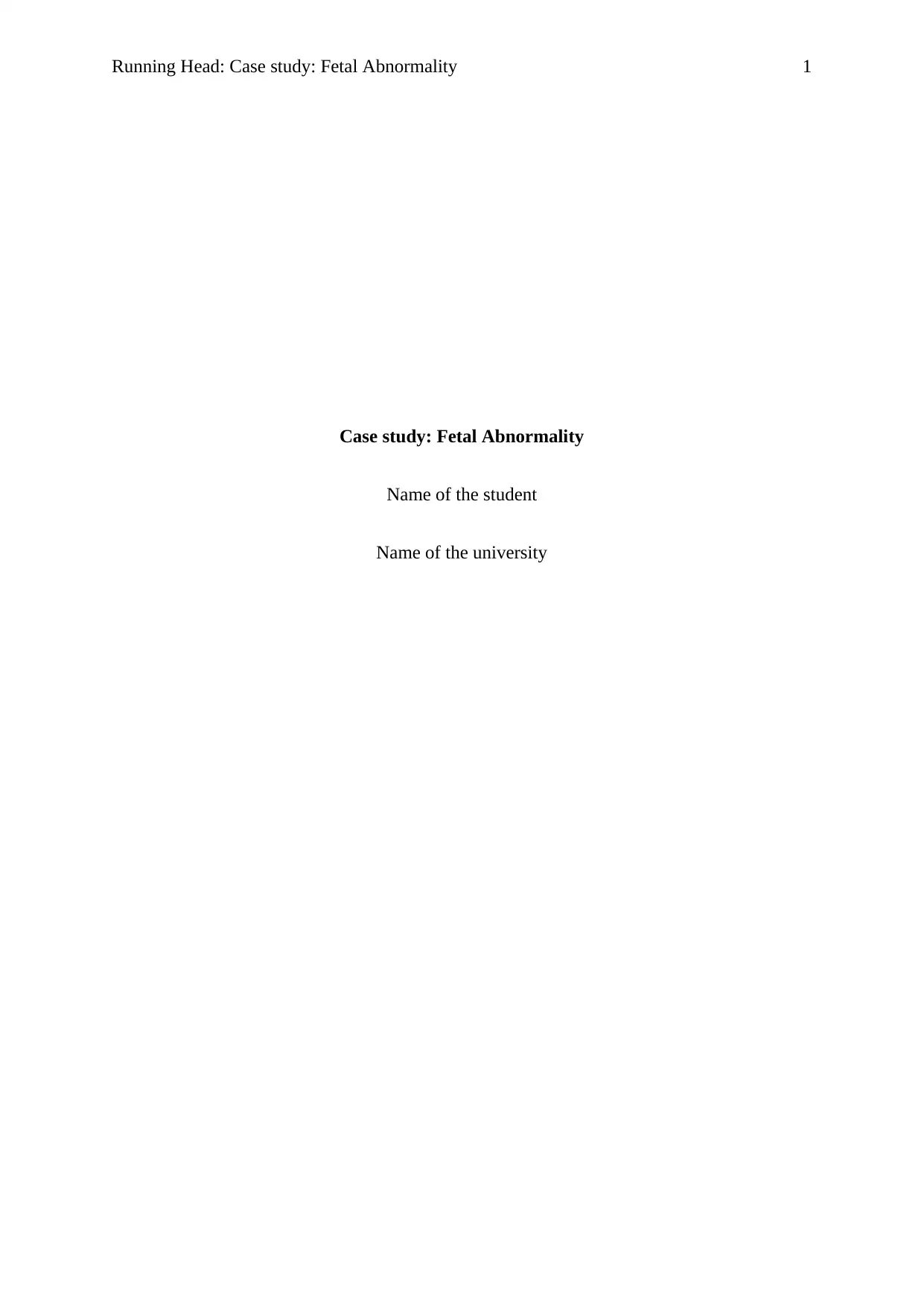
Running Head: Case study: Fetal Abnormality 1
Case study: Fetal Abnormality
Name of the student
Name of the university
Case study: Fetal Abnormality
Name of the student
Name of the university
Paraphrase This Document
Need a fresh take? Get an instant paraphrase of this document with our AI Paraphraser
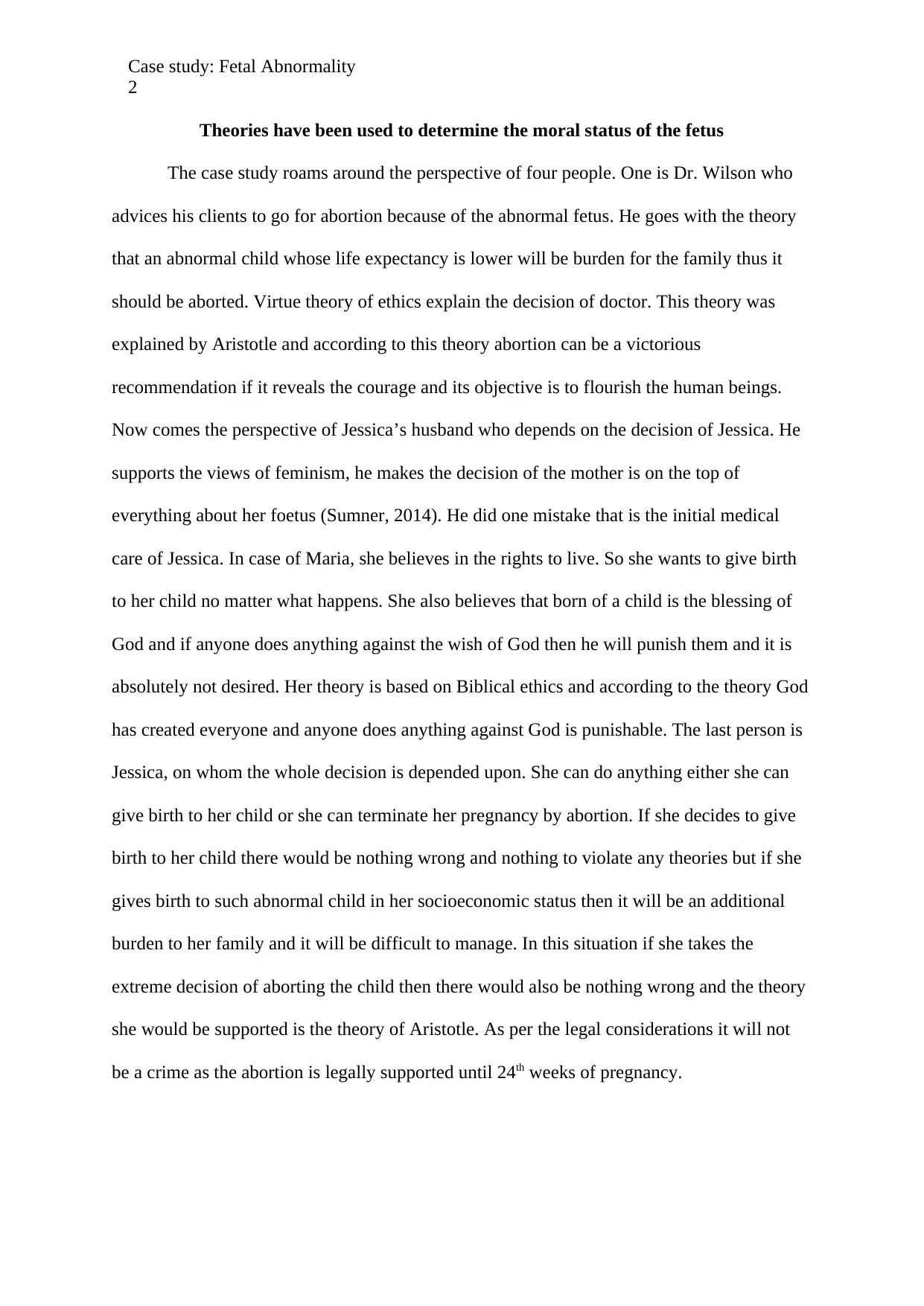
Case study: Fetal Abnormality
2
Theories have been used to determine the moral status of the fetus
The case study roams around the perspective of four people. One is Dr. Wilson who
advices his clients to go for abortion because of the abnormal fetus. He goes with the theory
that an abnormal child whose life expectancy is lower will be burden for the family thus it
should be aborted. Virtue theory of ethics explain the decision of doctor. This theory was
explained by Aristotle and according to this theory abortion can be a victorious
recommendation if it reveals the courage and its objective is to flourish the human beings.
Now comes the perspective of Jessica’s husband who depends on the decision of Jessica. He
supports the views of feminism, he makes the decision of the mother is on the top of
everything about her foetus (Sumner, 2014). He did one mistake that is the initial medical
care of Jessica. In case of Maria, she believes in the rights to live. So she wants to give birth
to her child no matter what happens. She also believes that born of a child is the blessing of
God and if anyone does anything against the wish of God then he will punish them and it is
absolutely not desired. Her theory is based on Biblical ethics and according to the theory God
has created everyone and anyone does anything against God is punishable. The last person is
Jessica, on whom the whole decision is depended upon. She can do anything either she can
give birth to her child or she can terminate her pregnancy by abortion. If she decides to give
birth to her child there would be nothing wrong and nothing to violate any theories but if she
gives birth to such abnormal child in her socioeconomic status then it will be an additional
burden to her family and it will be difficult to manage. In this situation if she takes the
extreme decision of aborting the child then there would also be nothing wrong and the theory
she would be supported is the theory of Aristotle. As per the legal considerations it will not
be a crime as the abortion is legally supported until 24th weeks of pregnancy.
2
Theories have been used to determine the moral status of the fetus
The case study roams around the perspective of four people. One is Dr. Wilson who
advices his clients to go for abortion because of the abnormal fetus. He goes with the theory
that an abnormal child whose life expectancy is lower will be burden for the family thus it
should be aborted. Virtue theory of ethics explain the decision of doctor. This theory was
explained by Aristotle and according to this theory abortion can be a victorious
recommendation if it reveals the courage and its objective is to flourish the human beings.
Now comes the perspective of Jessica’s husband who depends on the decision of Jessica. He
supports the views of feminism, he makes the decision of the mother is on the top of
everything about her foetus (Sumner, 2014). He did one mistake that is the initial medical
care of Jessica. In case of Maria, she believes in the rights to live. So she wants to give birth
to her child no matter what happens. She also believes that born of a child is the blessing of
God and if anyone does anything against the wish of God then he will punish them and it is
absolutely not desired. Her theory is based on Biblical ethics and according to the theory God
has created everyone and anyone does anything against God is punishable. The last person is
Jessica, on whom the whole decision is depended upon. She can do anything either she can
give birth to her child or she can terminate her pregnancy by abortion. If she decides to give
birth to her child there would be nothing wrong and nothing to violate any theories but if she
gives birth to such abnormal child in her socioeconomic status then it will be an additional
burden to her family and it will be difficult to manage. In this situation if she takes the
extreme decision of aborting the child then there would also be nothing wrong and the theory
she would be supported is the theory of Aristotle. As per the legal considerations it will not
be a crime as the abortion is legally supported until 24th weeks of pregnancy.
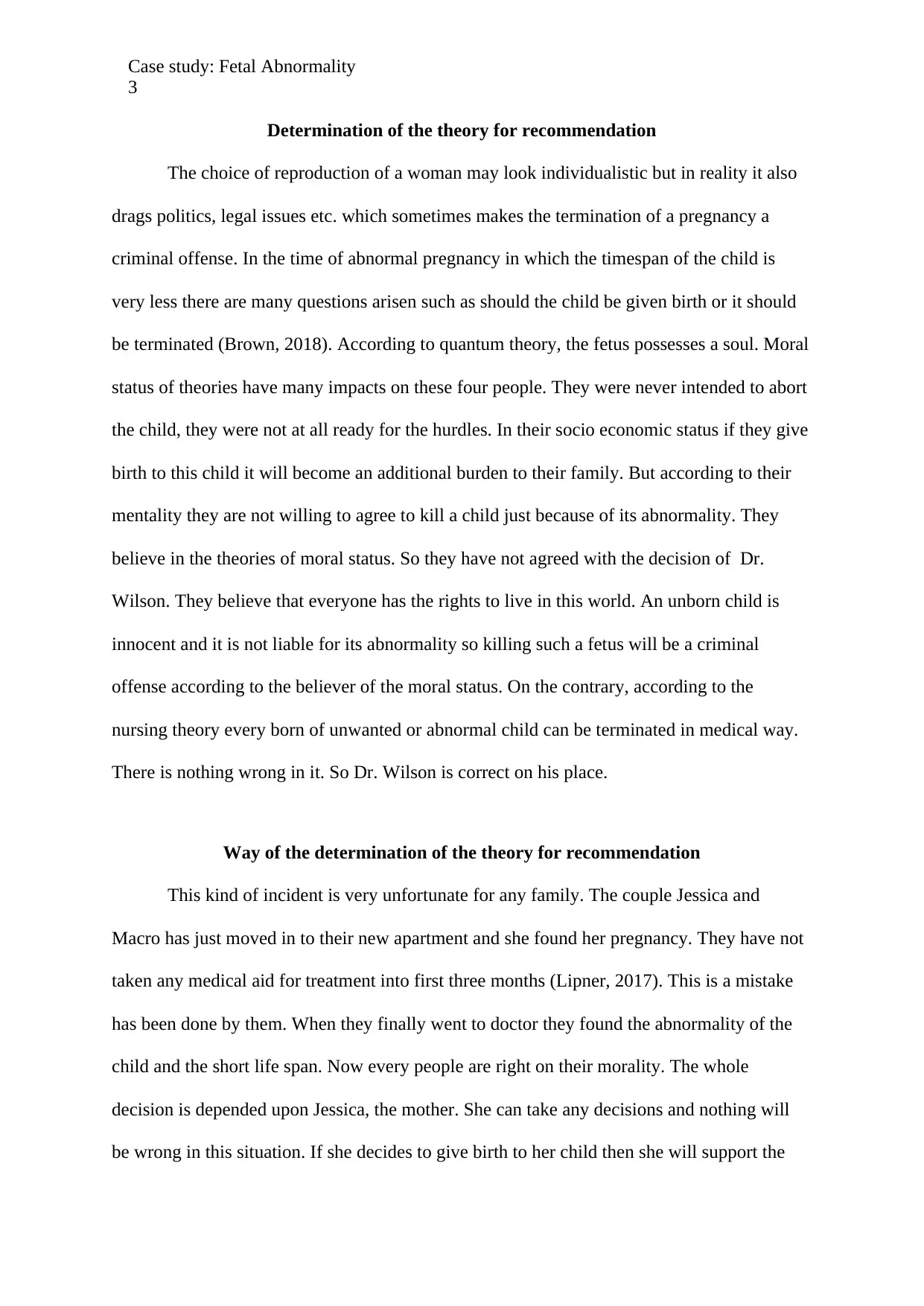
Case study: Fetal Abnormality
3
Determination of the theory for recommendation
The choice of reproduction of a woman may look individualistic but in reality it also
drags politics, legal issues etc. which sometimes makes the termination of a pregnancy a
criminal offense. In the time of abnormal pregnancy in which the timespan of the child is
very less there are many questions arisen such as should the child be given birth or it should
be terminated (Brown, 2018). According to quantum theory, the fetus possesses a soul. Moral
status of theories have many impacts on these four people. They were never intended to abort
the child, they were not at all ready for the hurdles. In their socio economic status if they give
birth to this child it will become an additional burden to their family. But according to their
mentality they are not willing to agree to kill a child just because of its abnormality. They
believe in the theories of moral status. So they have not agreed with the decision of Dr.
Wilson. They believe that everyone has the rights to live in this world. An unborn child is
innocent and it is not liable for its abnormality so killing such a fetus will be a criminal
offense according to the believer of the moral status. On the contrary, according to the
nursing theory every born of unwanted or abnormal child can be terminated in medical way.
There is nothing wrong in it. So Dr. Wilson is correct on his place.
Way of the determination of the theory for recommendation
This kind of incident is very unfortunate for any family. The couple Jessica and
Macro has just moved in to their new apartment and she found her pregnancy. They have not
taken any medical aid for treatment into first three months (Lipner, 2017). This is a mistake
has been done by them. When they finally went to doctor they found the abnormality of the
child and the short life span. Now every people are right on their morality. The whole
decision is depended upon Jessica, the mother. She can take any decisions and nothing will
be wrong in this situation. If she decides to give birth to her child then she will support the
3
Determination of the theory for recommendation
The choice of reproduction of a woman may look individualistic but in reality it also
drags politics, legal issues etc. which sometimes makes the termination of a pregnancy a
criminal offense. In the time of abnormal pregnancy in which the timespan of the child is
very less there are many questions arisen such as should the child be given birth or it should
be terminated (Brown, 2018). According to quantum theory, the fetus possesses a soul. Moral
status of theories have many impacts on these four people. They were never intended to abort
the child, they were not at all ready for the hurdles. In their socio economic status if they give
birth to this child it will become an additional burden to their family. But according to their
mentality they are not willing to agree to kill a child just because of its abnormality. They
believe in the theories of moral status. So they have not agreed with the decision of Dr.
Wilson. They believe that everyone has the rights to live in this world. An unborn child is
innocent and it is not liable for its abnormality so killing such a fetus will be a criminal
offense according to the believer of the moral status. On the contrary, according to the
nursing theory every born of unwanted or abnormal child can be terminated in medical way.
There is nothing wrong in it. So Dr. Wilson is correct on his place.
Way of the determination of the theory for recommendation
This kind of incident is very unfortunate for any family. The couple Jessica and
Macro has just moved in to their new apartment and she found her pregnancy. They have not
taken any medical aid for treatment into first three months (Lipner, 2017). This is a mistake
has been done by them. When they finally went to doctor they found the abnormality of the
child and the short life span. Now every people are right on their morality. The whole
decision is depended upon Jessica, the mother. She can take any decisions and nothing will
be wrong in this situation. If she decides to give birth to her child then she will support the
⊘ This is a preview!⊘
Do you want full access?
Subscribe today to unlock all pages.

Trusted by 1+ million students worldwide
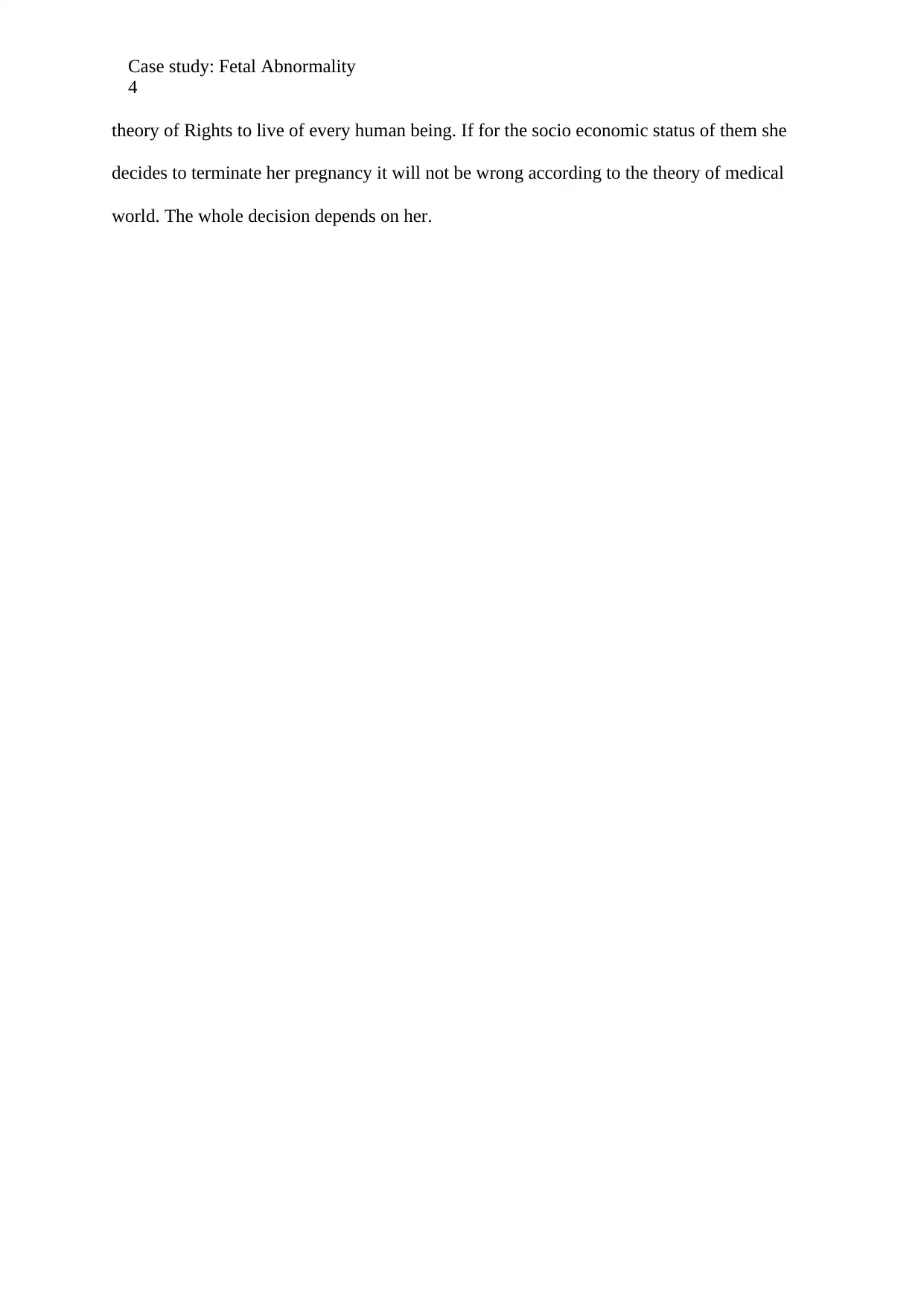
Case study: Fetal Abnormality
4
theory of Rights to live of every human being. If for the socio economic status of them she
decides to terminate her pregnancy it will not be wrong according to the theory of medical
world. The whole decision depends on her.
4
theory of Rights to live of every human being. If for the socio economic status of them she
decides to terminate her pregnancy it will not be wrong according to the theory of medical
world. The whole decision depends on her.
Paraphrase This Document
Need a fresh take? Get an instant paraphrase of this document with our AI Paraphraser
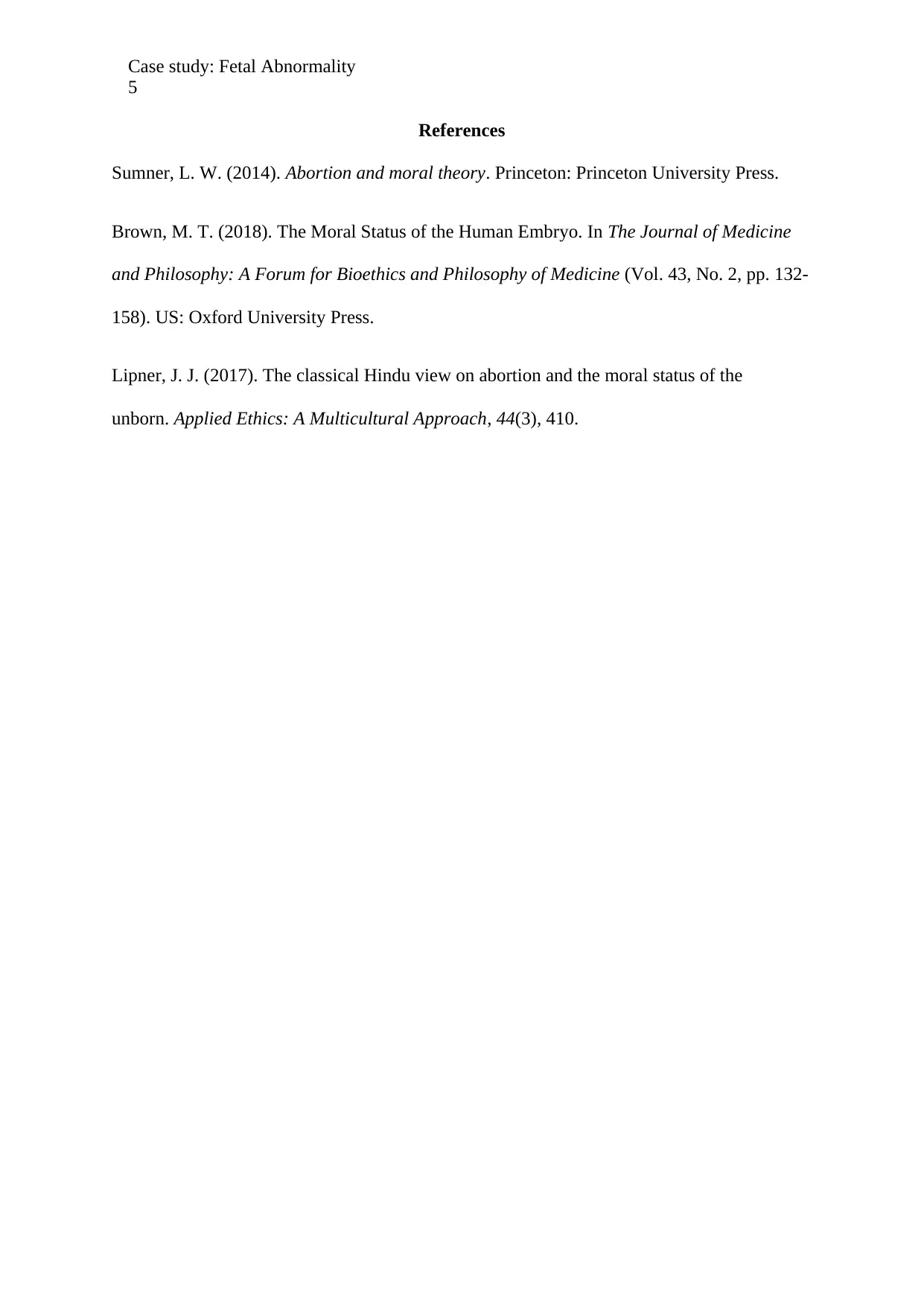
Case study: Fetal Abnormality
5
References
Sumner, L. W. (2014). Abortion and moral theory. Princeton: Princeton University Press.
Brown, M. T. (2018). The Moral Status of the Human Embryo. In The Journal of Medicine
and Philosophy: A Forum for Bioethics and Philosophy of Medicine (Vol. 43, No. 2, pp. 132-
158). US: Oxford University Press.
Lipner, J. J. (2017). The classical Hindu view on abortion and the moral status of the
unborn. Applied Ethics: A Multicultural Approach, 44(3), 410.
5
References
Sumner, L. W. (2014). Abortion and moral theory. Princeton: Princeton University Press.
Brown, M. T. (2018). The Moral Status of the Human Embryo. In The Journal of Medicine
and Philosophy: A Forum for Bioethics and Philosophy of Medicine (Vol. 43, No. 2, pp. 132-
158). US: Oxford University Press.
Lipner, J. J. (2017). The classical Hindu view on abortion and the moral status of the
unborn. Applied Ethics: A Multicultural Approach, 44(3), 410.
1 out of 5
Related Documents
Your All-in-One AI-Powered Toolkit for Academic Success.
+13062052269
info@desklib.com
Available 24*7 on WhatsApp / Email
![[object Object]](/_next/static/media/star-bottom.7253800d.svg)
Unlock your academic potential
Copyright © 2020–2026 A2Z Services. All Rights Reserved. Developed and managed by ZUCOL.





